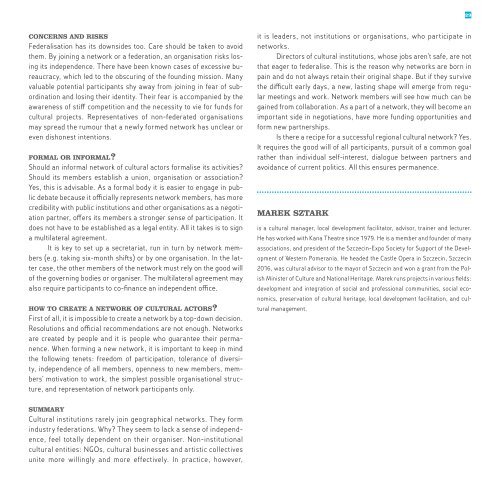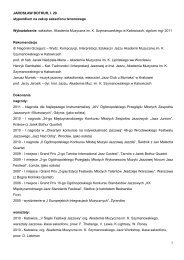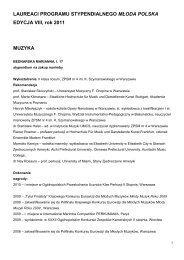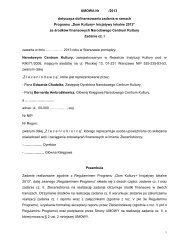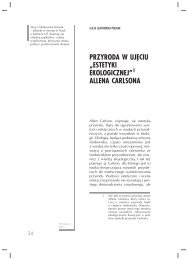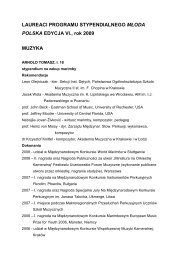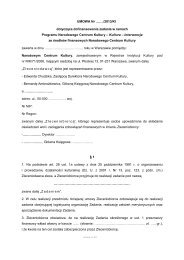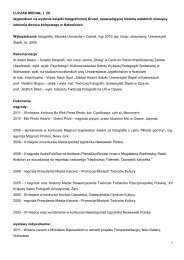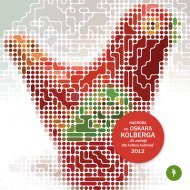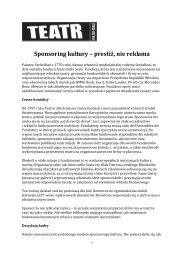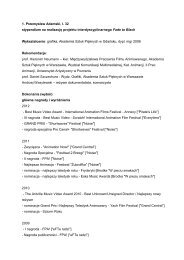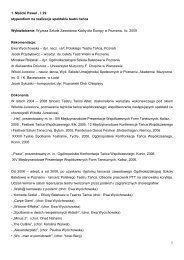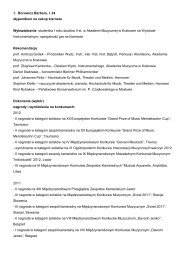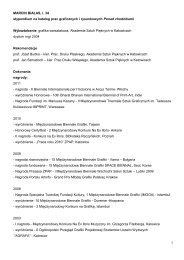Untitled - Narodowe Centrum Kultury
Untitled - Narodowe Centrum Kultury
Untitled - Narodowe Centrum Kultury
Create successful ePaper yourself
Turn your PDF publications into a flip-book with our unique Google optimized e-Paper software.
tytuł artykułu 29<br />
concerns and risks<br />
Federalisation has its downsides too. Care should be taken to avoid<br />
them. By joining a network or a federation, an organisation risks losing<br />
its independence. There have been known cases of excessive bureaucracy,<br />
which led to the obscuring of the founding mission. Many<br />
valuable potential participants shy away from joining in fear of subordination<br />
and losing their identity. Their fear is accompanied by the<br />
awareness of stiff competition and the necessity to vie for funds for<br />
cultural projects. Representatives of non-federated organisations<br />
may spread the rumour that a newly formed network has unclear or<br />
even dishonest intentions.<br />
formal or informal<br />
Should an informal network of cultural actors formalise its activities<br />
Should its members establish a union, organisation or association<br />
Yes, this is advisable. As a formal body it is easier to engage in public<br />
debate because it officially represents network members, has more<br />
credibility with public institutions and other organisations as a negotiation<br />
partner, offers its members a stronger sense of participation. It<br />
does not have to be established as a legal entity. All it takes is to sign<br />
a multilateral agreement.<br />
It is key to set up a secretariat, run in turn by network members<br />
(e.g. taking six-month shifts) or by one organisation. In the latter<br />
case, the other members of the network must rely on the good will<br />
of the governing bodies or organiser. The multilateral agreement may<br />
also require participants to co-finance an independent office.<br />
how to create a network of cultural actors<br />
First of all, it is impossible to create a network by a top-down decision.<br />
Resolutions and official recommendations are not enough. Networks<br />
are created by people and it is people who guarantee their permanence.<br />
When forming a new network, it is important to keep in mind<br />
the following tenets: freedom of participation, tolerance of diversity,<br />
independence of all members, openness to new members, members’<br />
motivation to work, the simplest possible organisational structure,<br />
and representation of network participants only.<br />
it is leaders, not institutions or organisations, who participate in<br />
networks.<br />
Directors of cultural institutions, whose jobs aren’t safe, are not<br />
that eager to federalise. This is the reason why networks are born in<br />
pain and do not always retain their original shape. But if they survive<br />
the difficult early days, a new, lasting shape will emerge from regular<br />
meetings and work. Network members will see how much can be<br />
gained from collaboration. As a part of a network, they will become an<br />
important side in negotiations, have more funding opportunities and<br />
form new partnerships.<br />
Is there a recipe for a successful regional cultural network Yes.<br />
It requires the good will of all participants, pursuit of a common goal<br />
rather than individual self-interest, dialogue between partners and<br />
avoidance of current politics. All this ensures permanence.<br />
marek sztark<br />
is a cultural manager, local development facilitator, advisor, trainer and lecturer.<br />
He has worked with Kana Theatre since 1979. He is a member and founder of many<br />
associations, and president of the Szczecin-Expo Society for Support of the Development<br />
of Western Pomerania. He headed the Castle Opera in Szczecin, Szczecin<br />
2016, was cultural advisor to the mayor of Szczecin and won a grant from the Polish<br />
Minister of Culture and National Heritage. Marek runs projects in various fields:<br />
development and integration of social and professional communities, social economics,<br />
preservation of cultural heritage, local development facilitation, and cultural<br />
management.<br />
summary<br />
Cultural institutions rarely join geographical networks. They form<br />
industry federations. Why They seem to lack a sense of independence,<br />
feel totally dependent on their organiser. Non-institutional<br />
cultural entities: NGOs, cultural businesses and artistic collectives<br />
unite more willingly and more effectively. In practice, however,


